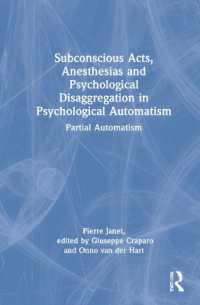Full Description
The history of ideas on rule of law for world order is a fascinating one, as revealed in this comparative study of both Eastern and Western traditions. This book discerns 'rule of law as justice' conceptions alternative to the positivist conceptions of the liberal internationalist rule of law today.
The volume begins by revisiting early-modern European roots of rule of law for world order thinking. In doing so it looks to Northern Humanism and to natural law, in the sense of justice as morally and reasonably ordered self-discipline. Such a standard is not an instrument of external monitoring but of self-reflection and self-cultivation. It then considers whether comparable concepts exist in Chinese thought. Inspired by Confucius and even Laozi, the Chinese official and intellectual elite readily imagined that international law was governed by moral principles similar to their own. A series of case studies then reveals the dramatic change after the East-West encounters from the 1860s until after 1901, as Chinese disillusionment with the Hobbesian positivism of Western international law becomes ever more apparent.
What, therefore, are the possibilities of traditional Chinese and European ethical thinking in the context of current world affairs? Considering the obstacles which stand in the way of this, both East and West, this book reaches the conclusion that everything is possible even in a world dominated by state bureaucracies and late capitalist postmodernism. The rational, ethical spirit is universal.
Contents
Anthony Carty and Janne Nijman: Introduction: The Moral Responsibility of Rulers: Going Back Beyond the Liberal 'Rule of Law' for World Order
Part I: Law and Justice in Early Modern European Thought on World Order
1: Joseph Canning: The Universal Rule of Law in the Thought of the Late Medieval Jurists of Roman and Canon Law
2: Susan Longfield Karr: 'The Law of Nations is Common to all Mankind': Jus gentium in Humanist Jurisprudence
3: Andrew RC Simpson: 'Cleare as is the Summers Sunne'? Scottish Perspectives on Legal Learning, Parliamentary Power and the English Royal Succession
4: Xavier Tubau: Humanism, the Bible, and Erasmus' Moral World Order
5: Anthony Pagden: Legislating for the 'Whole World that is, in a Sense, a Commonwealth': Conquest, Occupation, and the Obligation to 'Defend the Innocent'
6: Anthony Carty: Cardinal Richelieu between Vattel and Machiavelli
7: John Witte Jr.: The Universal Rule of Natural Law and Written Constitutions in the Thought of Johannes Althusius
8: Christoph Stumpf: Hugo Grotius and the Universal Rule of Law
9: Peter Goodrich: Aquatopia: Lines of Amity and Laws of the Sea
10: Janne Nijman: A Universal Rule of Law for a Pluralist World Order: Leibniz's Universal Jurisprudence and his Praise of the Chinese Ruler
Part II: Law and Justice in Chinese Thought on World Order
11: Aihe Wang: Moral Rulership and World Order in Ancient Chinese Cosmology
12: Chun-chieh Huang: 'Humane Governance' as the Moral Responsibility of Rulers in East Asian Confucian Political Philosophy
13: Hu Henan: Bridging the Western and Eastern Traditions: A Comparative Study of the Legal Thoughts of Hugo Grotius and Lao Zi
14: Emily Cheung and Maranatha Fung: The Hazards of Translating Wheaton's 'Elements of International Law' into Chinese: Cultures of World Order Lost in Translation
15: Tian Tao: Chinese Intellectuals' Discourse of International Law in the Late 19th Century and Early 20th Century
16: Patrick Sze-lok Leung and Anthony Carty: The Crisis of the Ryukyus 1877-1882: Confucian World Order Challenged and Defeated by Western/Japanese Imperial International Law
17: Anna Baka and Lucy QI: Lost in Translation in the Sino-French War in Vietnam: From Western International Law to Confucian Legal Semantics: A Comparative-Critical Analysis of Chinese, French, and American Archives
18: Patrick Sze-Lok Keung and Bijun Xu: The Sino-Japanese War and the Collapse of the Qing and Confucian World Order in the Face of Japanese Imperialism and European Acquiescence
19: Jing Tan and Anthony Carty: Confucianism and Western International Law in 1900: Li Hongzhang and Sir Ernest Satow Compared: The Case Study of the Crisis of Russia in Manchuria 1900-1







